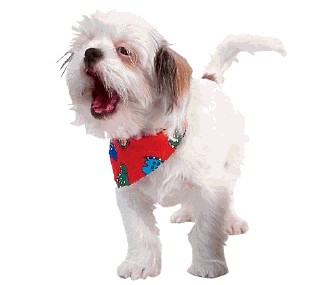Ok, this is just an exaggeration.
Does your puppies' teeth and you skin seem to have an affinity for each other? Mouthing and Nipping is very common for puppies (especially when they're teething or changing into adult teeth!) but aggressive biting and growling is not. Either way, teeth and skin should NEVER go together. Today we'll talk about the problem of mouthing and nipping in puppies.
Mouthing and nipping are two different issues. Mouthing is more of a communication skill to express a need or confusion or to simply gain your attention. It usually involves lesser force and pressure, but still really annoying and can escalate into a ruckus if we unknowingly encourage it! Nipping, on the other hand, is a puppy thing; it involves slightly more pressure. When your puppy still hung out with his litter-mates, he nipped during play and to determine his rank. When you bring your puppy home, this behavior continues. Nipping puppies are bossy and manipulative and need a firmer regimen.
To correct these behaviors, your want to create a cause-and-effect in your puppies' minds, at the same time, you do not want him/her to think that the effect is coming from you. Any reaction that you give to your puppy is a form and attention and it encourages whatever action (or state of mind) your dog is doing (or in). We need our doggies to learn that nipping and mouthing is not a fun thing to do at all.
Please note that it is inhumane to correct a puppy younger than 3 months as they do not have the capacity to understand the concept of "wrong". Correcting them at this phase will scar your pup permanently and erode his/her trust in you! (:
Please note that it is inhumane to correct a puppy younger than 3 months as they do not have the capacity to understand the concept of "wrong". Correcting them at this phase will scar your pup permanently and erode his/her trust in you! (:
Young puppies mouth a lot. They mouth when playing, and they also mouth to
communicate their needs (much like barking).
If your puppy starts mouthing, ask yourself these questions: Is he hungry or thirsty? Does he need to pee/poop? Is he tired? Does he need to play?
If your puppy starts mouthing, ask yourself these questions: Is he hungry or thirsty? Does he need to pee/poop? Is he tired? Does he need to play?
Remember, puppies mouth when they have a need (even if the need is attention).
Here are some steps you could follow:
- If your puppy doesn’t need anything and he still won’t quit, crate or isolate him with a favorite toy. Don’t scold your puppy as you isolate him. We do not want your pup to see the crate as a negative object. Calmly place the puppy in his area.
- Encourage you pup to lick you instead. We like to use the word "Love-Love" whenever our pup licks us. You can try rubbing some butter or honey on your your skin to get him/her to lick you, he/she will slowly learn to lick instead of nipping/mouthing!
- It is important to ignore your pup when he/she is nipping softly. Keep your hand still.
- If this situation escalates, turn quickly to him/her and say "NO!"is a firm voice. Stare at him/her for a few seconds. Do not be the one that breaks eye contact. (Most pups will look away quickly)
- Refocus his mind with a "Love-Love" command (or the word of your choice) to let him/her understand you both would appreciate the licking more than nipping.
- If your pup still persists, try spraying some "bitter-spray" (natural ingredients only, please) on your skin. Or giving a slight tug on your pup's collar.
- If necessary, crate your pup. Remember, stay calm.
Other important points to note:
- Changing a Pup's behavior requires consistency. Stay firm with the rules, do not relent.Otherwise, your dog will learn that rules are not meant to be followed.
- Postpone all games of "confrontational" nature to a later age. These games include wrestling, tug of war, chasing your puppy around, and teasing. These games teach puppies to challenge you, to be confrontational, to be dominant!
- Bitter-Sprays can be lifesavers, spray it on objects that your dog seem to like to nip on, be it the coffee table, electrical wire casings or your hands.
- Using a lead/short leash at home, to give a quick tug if you catch him/her nipping anything.
- If he continues to nip, ask yourself these questions: Do I look convinc-ing? Am I tugging or pulling? (Pulling encourages play.) Is my puppy takingme seriously?
- Always consult a professional (dog trainer/behaviorists) if in any doubt. Do not "correct" your pup too harshly.
We sure hope these little pointers helped! :D
Every doggy can be the sunshine of our lives, strict rules and boundaries just need to be enforced right from the start.
An ill-trained doggy will have more tendencies to make mistakes, and both you and the doggy will end up feeling frustrated and upset!
Lets aim to put that to a minimum! :D




